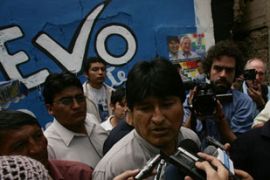Bolivian protesters burn building
At least 22 people are injured as demonstrators demand state governor resigns.

Local media reported at least 22 were injured in the clash, several of whom were journalists covering the event.
Morales’ administration immediately criticised the response as excessive and fired the newly appointed state police commander just two hours after he had assumed the post.
Alicia Munoz, the government minister whose office oversees law enforcement throughout Bolivia’s nine states, said the violence was an indication that Bolivia’s central government must keep tighter reins on local police.
| “There will be control because we will not permit any more acts of violence or acts of repression against the social sectors who, in this case, were demonstrating peacefully” Alicia Munoz, government minister |
It was the third time in recent weeks that demonstrators have packed Cochabamba’s tree-lined central plaza to demand the resignation of Governor Manfred Reyes Villa, a former presidential candidate who is believed to still have national political ambitions.
In December, Reyes also called for Cochabamba to hold a second vote on a referendum to give Bolivia’s nine states greater autonomy from Morales’ central government.
Both of Reyes’ newly stated positions have proven distinctly unpopular in Morales’ home state.